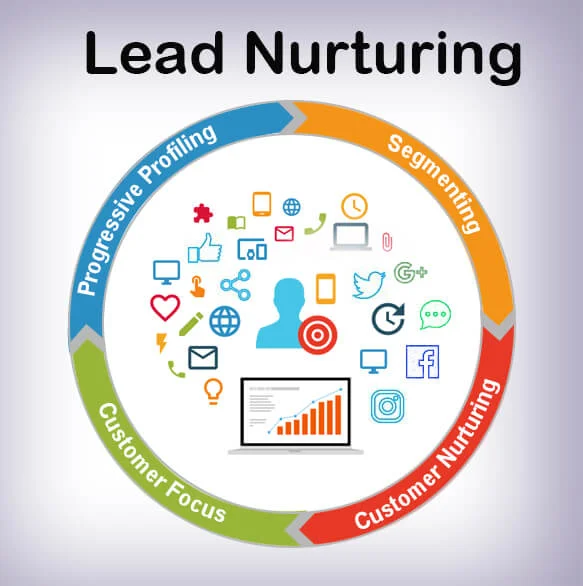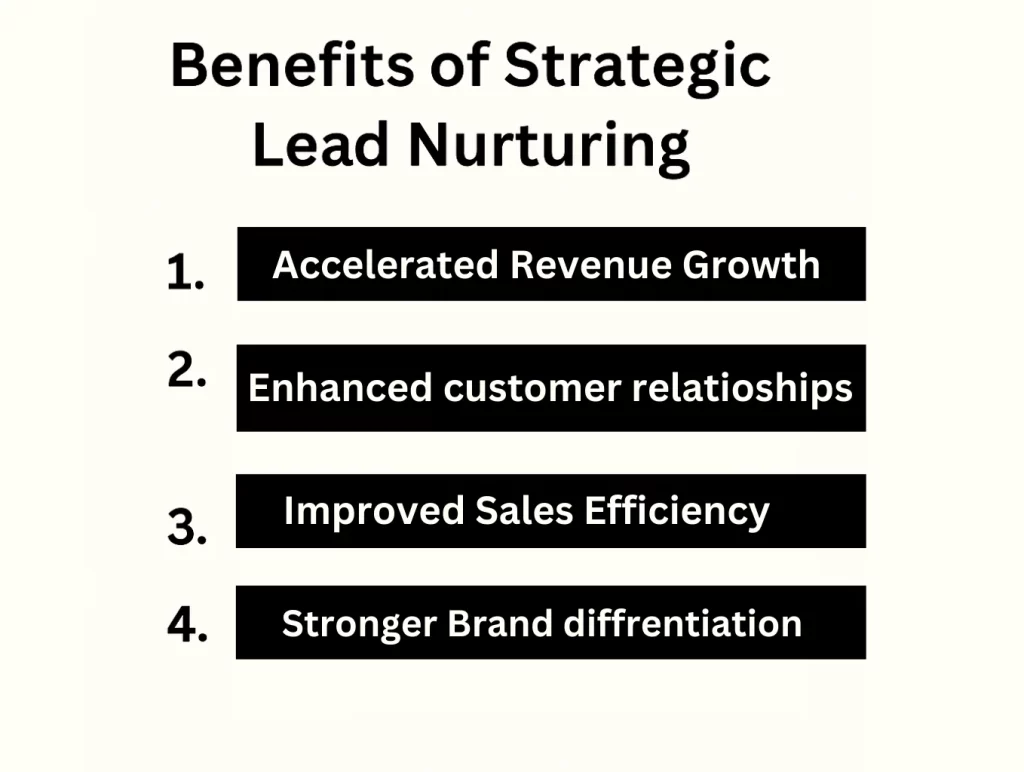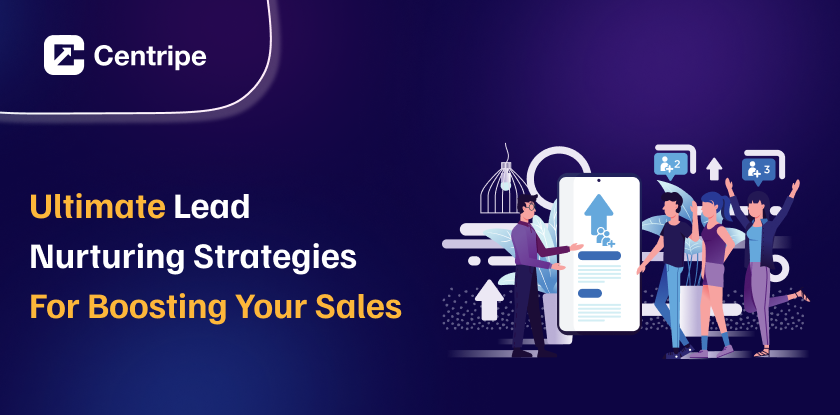Suppose you are walking into a store where the salesperson says hello… and then ignores you completely.
No questions, no suggestions, just silence. Chances are, you’d walk out and never return.
That’s exactly what happens when businesses collect leads but never engage with them again.
It’s no surprise then that 80% of new leads never turn into sales.
The ones that do get regular, relevant follow-ups are a different story. Companies that nurture leads see 50% more sales-ready prospects at 33% lower cost, and those customers end up spending 47% more over time.
In this post, we’ll not only explore effective lead nurturing strategies but also build a clear understanding of lead management, how it connects every stage of engagement to turn curious prospects into loyal customers.
What are Lead Nurturing Strategies?

Lead nurturing is all about building relationships with prospects from the moment they notice you and until they become loyal customers.
In simple language, it’s about sending the right time, through the right channels, while showing you genuinely care about solving their problems.
If you are unsure how to qualify leads effectively, check out our guide on lead qualification criteria.
7 Proven Lead Nurturing Strategies for B2B Success
1. Map the Buyer Journey smartly:
The Strategy: Plan the full path your ideal buyers take, from first hearing about you to becoming loyal customers. Know what they need, when they need it, and what pushes them to act.
MQL (Marketing Qualified Lead):
Interested and fits your ideal profile, but not ready for sales yet. Marketing keeps warming them up. To go deeper into how marketing and sales sync, see our breakdown of lead nurturing best practices.
How to Do it:
Start simple, then layer in complexity:
- Map the stages: Awareness → Consideration → Decision → Retention → Advocacy
- Identify personas: Document 3-5 key buyer personas (with real pain points, not made-up stuff)
- Define touchpoints: List every single interaction, website visits, emails, calls, support tickets, everything
- Assign content: Match the right content to the right stage/persona
Example:
Awareness Stage (Marketing Ops Manager):
- Pain Point: Too much manual lead routing
- Content: Industry report via LinkedIn/blog
- Next Step Trigger: Downloads comparison guide
Consideration Stage:
- Pain Point: Evaluating Automation Tools
- Content: ROI calculator + customer success stories
- Next Step Trigger: Visits pricing page or book demo.
2. Run Multi-Channel Nurturing Campaigns:
The Strategy: Don’t Rely Solely on Email. Combine email, social, paid ads, direct mail, and even SMS to stay visible without spamming. Companies using 3+ channels see a 287% higher purchase rate.
How to do it:
- Email foundation: Build those 5-7 helpful emails per persona.
- Social engagement: Engage with their posts (real, not spammy)
- Retargeting campaigns: Ads based on what they viewed.
- Direct mail integration: For big deals, send something physical.
- SMS follow-up: Event or Webinar reminders
Channel Coordination Example:
| Touchpoint | Channel | Timing | Content |
|---|---|---|---|
| Initial Interest | 2 hours | Welcome + Quick win | |
| No click | LinkedIn Ad | 24 hours | Related content |
| Pricing visit | Sales Alert + Email | Immediate | Personalized Outreach |
| Multiple Assets | Direct Mail | 3 days | Premium Package |
| Demo Booked | SMS | 24 hours before | Reminder + Prep |
3. Nail your Email Drip Campaigns:
The Strategy: Send email sequences that react to what people do. As per the research, behaviour-based emails get 5x more clicks than generic blasts.
In these campaigns, content should be relevant to the lead’s role, sent at the right time, and gather information gradually.
Focus on:
- Behavioral triggers
- Personalize content
- Optimal timing
- Progressive profiling
- Re-engagement emails
4. Deliver Hyper-Personalized Content Experiences:
The Strategy: Use the information you already have about your prospects to create experiences that feel custom-made just for them. Personalization helps marketers see real improvements; 88% people say it works.
How to do it:
- Change your website content based on who’s visiting.
- Use Smart CTAs that offer different things based on where the prospects are in their journey.
- Use Industry-specific language they understand.
5. Implement Strategic Lead Scoring
The Strategy: Lead scoring helps your team focus on the best prospects instead of wasting time on everyone. It works even better when integrated with lead management tools, which automate scoring, tracking, and communication, making your entire nurturing workflow smoother and more efficient.
How to build:
Demographic Scoring (Fit): How closely they match your ideal customer profile:
- Job title match: +20 points
- Company size: +15 points
- Industry fit: +10 points
- Location: +5 points
Behavioral Scoring (Interest): How engaged they are:
- Request a Demo: +50 points
- Visiting Pricing page: +20 points
- Downloaded Case study: +15 points
- Attended Webinar: +25 points
- Email engagement: +5 per open, +10 per click
Scoring Thresholds:
- 0-49 points: Keep nurturing
- 50-79 points: Turn up the heat
- 80-99 points: SDR reaches out
- 100+ points: Get sales on the phone NOW
6. Create Content That Actually Nurture Leads:
The Strategy: Give prospects the answer they need at every stage, without turning everything into a sales pitch.
What to share at each Stage:
Top of Funnel (Awareness): Industry insights, problem/solution blogs, Helpful infographics, podcasts.
Middle of Funnel (Consideration): Honest comparison guides, ROI calculators, educational webinars, case studies.
Bottom of Funnel (Decision): Free trials, Custom proposals, customer reference, Onboarding previews
Expert Tip: The best nurturing content doesn’t sell, it helps. Focus on being genuinely useful at each stage, and the sales will follow.” – Jay Baer
7. Align Sales and Marketing for smooth Handoffs:
The Strategy: Get marketing and sales working as one team. When they align, companies see up to 208% more revenue, worth the extra effort.
How to Align:
- Define MQL criteria
- Establish SLAs
- Create feedback loops
- Share intelligence
- Coordinate messaging
Example Agreement:
- Marketing sends 100 qualified leads a month.
- Sales call hot leads within 4 hours, warm leads within 24 hours.
- Weekly pipeline reviews to discuss quality
👉 Explore more articles: 15 Lead Generation Strategies To Boost Sales in 2026
Benefits of Strategic Lead Nurturing

Before we jump into strategies, here’s why lead nurturing is worth your time:
1. Accelerated Revenue Growth
Nurturing emails get 4-10x more responses than regular blasts. Companies with strong nurturing see 20% more sales opportunities, and nurtured leads spend 47% more on average.
2. Enhanced Customer Relationships
As per the recent study, 41% of customers will switch to a competitor if they get poor personalization. Personalized emails get 2.5x more clicks, and multi-channel nurturing boosts engagement by 300%
3. Improved Sales Efficiency
In crowded B2B spaces, consistent nurturing keeps you top-of-mind, positions you as the obvious choice, and turns prospects into fans even before they buy.
4. Stronger Brand Differentiation
In crowded B2B spaces, consistent nurturing keeps you top-of-mind, positions you as the obvious choice, and turns prospects into fans even before they buy.
Common Lead Nurturing Mistakes to Avoid
- Over-nurturing: Sending too many messages can annoy your prospect. Nobody wants 3 emails a day; they’ll unsubscribe before you can even make your pitch.
Solution: Focus on quality. Space out your communication and make sure every touchpoint delivers value. - Under personalization: Treating all leads the same is a big mistake. Generic, copy-paste messaging feels cold and disconnected.
Solution: Use their name, interests, and past behavior to make it feel personal. - Bad timing: Time is everything in lead nurturing. Send your message too early, and the lead might not be ready to take action.
Solution: Watch for buying signals, and follow up quickly when interest is high. - Relying on one channel: Only using email limits your reach. Some prospects prefer LinkedIn, others webinars, or SMS.
Solution: Spread your efforts across multiple channels to increase your chances of staying on their radar. - Not testing your approach: Going with your gut feeling instead of data is risky. The subject line you love might not be the one that gets clicks.
Solutions: Test different messages, formats, and timings, so you can double down on what works. - Content gaps: Your lead needs the right information at the right stage to move forward. If someone is comparing solutions, they need case studies, not just beginner tips.
Solutions: Map your buyers and create content for every stage so there are no roadblocks.
Conclusion
If you are not nurturing your leads, you’re leaving money on the table.
Buyers want personal, helpful touchpoints at every step.
Here’s how to win:
- Know your leads and their journey.
- Share content they actually need.
- Connect your channels
- Track what drives revenue
- Keep sales and marketing in sync
When done rightly, it brings better leads, cuts costs, speeds sales, and boosts customer speed, building an edge that lasts. Pairing these strategies with a strong lead management process gives you an edge that lasts.
